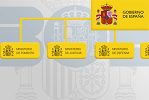Posted workers: Employment
Content
Posting of workers to Spain as part of the transnational provision of services
This situation is governed by Law 45/1999 of 29 November.
This law regulates the temporary posting of workers to Spain in the context of international service provision. It obliges foreign companies to guarantee these workers, as a minimum, the basic working conditions established in Spain, regardless of the legislation applicable to their employment contract.
To whom does Law 45/1999 on posting of workers as part of the transnational provision of services apply?
It applies to companies established in an EU Member State or in a State that is a party to the Agreement on the European Economic Area (EEA: Iceland, Liechtenstein, Norway) when they temporarily post their workers to Spain as part of the transnational provision of services.
Which workers are not affected by Law 45/1999?
- It does not apply to seagoing personnel in merchant navy undertakings.
- Nor does it apply to postings made for the purpose of implementing training activities that are not considered a transnational provision of services.
What is understood by posting of workers as part of the transnational provision of services? (Article 2.1.1º Law 45/1999)
The posting of a worker to Spain for a limited period of time by the aforementioned companies. This is when:
-
A worker is posted to Spain on behalf of and under the supervision of their company to fulfil a contract signed by their company and the service recipient when the latter is established in or conducts its business in Spain. In the road transport sector, the special provisions of Chapter V of the law apply, which are summarised in the last section of this page.
-
A worker is posted to premises belonging to their company or to another company in the same group as their company.
For the purposes of the previous section, a group means a group of companies formed by a controlling company and the controlled companies in accordance with Article 4 of Law 10/1997 of 24 April ![]() on the information and consultation rights of employees in Community-scale companies and groups of undertakings.
on the information and consultation rights of employees in Community-scale companies and groups of undertakings.
c.The posting of a worker by a temporary employment company in order to offer their services to a user company that is based in or exercises their business activity in Spain.
¿What rules apply to employees living in a different country (cross-border employment)?
In the case of cross-border workers, only the labour law and Social Security practices of the place where they provide their services apply. In this case, that is Spain.
Does Law 45/1999 apply to workers who live in a different country and are regularly posted to another country (in this case, Spain) to work and then return to their home at the end of the working day (cross-border workers)?
No, Law 45/1999 does not apply to these cases, as the legal concept of ‘posted workers’ is not the same as cross-border services.
According to labour law, cross-border workers are subject to the laws of the country where they work, in this case, Spain. They are only affected by the applicable Social Security laws of the country where they provide their services which, in this case, is Spain.
Working conditions of posted workers (Article 3 of Law 45/1999)
Regardless of the legislation applicable to their employment contract, companies must guarantee their posted workers the working conditions established by Spanish labour law in relation to the following matters.
- Working hours: Articles 34–38 of the Workers’ Statute and Royal Decree 1561/1995 of 21 September on special working hours .
- Level of pay, pursuant to Article 4 of Law 45/1999 of 29 November on the posting of workers for the transnational provision of services in accordance with the statutory or regulatory provisions on minimum wages and the collective agreements applicable in the place and in the sector or branch of activity concerned.
- Equal treatment and prevention of direct or indirect discrimination on the grounds of sex, origin, including racial or ethnic origin, civil status, age within legally imposed limits, social status, religion or belief, political beliefs, sexual orientation, membership (or not) of a trade union and participation in its agreements, family ties with other workers in the company, language or disability, provided that the workers are fit to carry out the work or job in question (Articles 17 and 28 of the Workers’ Statute ; Royal Decree 901/2020 of 13 October regulating equality plans and their registration and amending Royal Decree 713/2010 of 28 May on the registration and deposit of collective labour agreements ).
- Work by minors ( Articles 6 and 7 of the Workers’ Statute , and the Decree of 26 July 1957 on industries and jobs that women and minors are not permitted to do due to their dangerous and unhealthy nature
 ).
). - Occupational risk prevention, which includes rules on maternity protection and the protection of minors ( Law 31/1995 on occupational risk prevention ).
- Prevention of discrimination against temporary and part-time workers (Articles 15(6)
and 12(4) of the Workers’ Statute ).
- Respect for privacy and due consideration of workers’ dignity, including protection against verbal or physical sexual harassment (Articles 4(2)(e), 18 and 20 of the Workers’ Statute , and Article 12 of Organic Law 10/2022 of 6 September on the comprehensive guarantee of sexual freedom
 ).
). - Freedom of association and the right to strike and meet ( Organic Law 11/1985 on freedom of association ; Royal Decree-Law 17/1977 on labour relations
; Articles 77–81 of the Workers’ Statute ).
- The conditions for posting workers, including those laid down in Article 3(2) and (7) of Law 45/1999.

- The conditions applicable to worker accommodation, if the employer provides accommodation for workers away from their normal place of work.
- Daily allowances or expenses to cover travel, board and lodging costs incurred by workers posted to Spain if, during their stay, they are required to travel to and from their usual place of work in Spain to another place other than their temporary residence in Spain for professional reasons or if their employer temporarily sends them from that usual place of work to another place of work in Spain or abroad.
These working conditions are those established in Spanish laws and regulations, and in the collective agreements and applicable arbitration decisions in the place, sector or branch of activity in question.
The above is without prejudice to the application of more favourable working conditions to posted workers, which might be derived from the provisions of the legislation applicable to their employment contracts, in collective agreements or in individual employment agreements.
Duration of the posting
Notification of the posting
- It is mandatory to notify the Spanish authorities of a posting. Regardless of its duration, except for the postings set out in Article 2.1.1.(a) and (b) of Law 45/1999
 with a duration of no more than eight days.
with a duration of no more than eight days. - It must be reported before the posting.
- It can be reported electronically: addressed to the Spanish labour authorities of the autonomous community where the services are to be provided (corresponding employment department). If the services are to be provided in the territory of the Autonomous Cities of Ceuta and Melilla, the posting notification must be sent to the Labour and Immigration Unit of the respective Government Delegations.
- It is possible to notify the Spanish authorities of a posting electronically, through the Labour and Social Security Inspectorate app, which can be accessed here: Law 45 - Portal (mites.gob.es).
Data and information to be included in the notification
- Name of the company posting the worker.
- Tax address and company tax registration number, for VAT purposes.
- Personal and professional details of the posted workers.
- Name of the company or companies and, as applicable, the workplace or workplaces where the posted workers will provide their services.
- Planned start date and duration of the posting.
- Services to be provided by the posted workers in Spain. Indication of the type of posting pursuant to Article 2.1.1.
- Identification and contact details of a natural or legal person in Spain designated by the company as their representative to serve as a liaison with the Spanish authorities and for sending and receiving documents or notices, if required.
- Identification and contact details of a person who can act in Spain on behalf of the company providing the services in any worker information and consultation procedures and negotiations that affect the workers posted to Spain.
- When a posting is made by a temporary employment company, in addition to the above, the notification must also include:
- Proof that they comply with the requirements to act as a temporary employment company in force under the laws of the state in which they are established.
- A description of the temporary employment needs of the user company and grounds for the labour supply contract.
- The labour authority will inform the Labour and Social Security Inspectorate and the State Tax Administration Agency of the posting notifications received, in accordance with the relevant regulations.
- In the case of road transport drivers, who are subject to special rules pursuant to Chapter V of the Law, the above does not apply. In these cases notification is mandatory, regardless of the duration of the posting, and must be made by the haulage company using the standard multilingual form on the public portal of the Internal Market Information System (IMI), in accordance with Article 22.1 of Law 45/1999 of 29 November.

In this case, the notification must include the following information:
- identity of the haulage company;
- contact details of the person in the State of establishment who will make the relevant arrangements with the labour authorities;
- identity, address and driving licence of the driver;
- start date of the driver’s contract and applicable legislation;
- planned start and end dates of the posting;
- vehicle registration plates;
- type of transport service: freight, passenger, international or domestic transport.
Information on the relevant body
- Directorate-General for Labour of the Ministry of Labour and Social Economy

- The labour authority of the autonomous community in Spain where the services are to be provided.
- Functional Work and Immigration Areas of the Government Offices in the Autonomous Cities of Ceuta and Melilla.
Persons who can request information
- Information bodies of other EU or EEA member states.
- Companies posting workers to Spain or the associations that represent them.
- The recipients of the transnational provision of services or the associations that represent them.
- The posted workers or workers who are going to be posted, or other bodies that represent them.
National liaison centre to be contacted in the event of queries about the competent labour authority:
Sub-Directorate General for Regulatory Organisation, Directorate General of Employment (![]() sgon@mites.gob.es ).
sgon@mites.gob.es ).![]()
Inspection and Cooperation with the Public Administrations of other States
- The implementation of the functions of surveillance and enforcement of compliance with Law 45/1999 is the responsibility of the Labour and Social Security Inspectorate.
- The labour authority and the Labour and Social Security Inspectorate may obtain cooperation and assistance and provide them on a reciprocal basis to the Public Administrations of other EU or EEA member states responsible for information and surveillance of compliance with the working conditions foreseen in Law 45/1999 or in the national transposition rules of Directive 96/71/EC.
- The personal data processing conducted pursuant to this law will be carried out in accordance with Organic Law 3/2018 of 5 Decembe
 r on personal data protection and ensuring digital rights.
r on personal data protection and ensuring digital rights.
Posting of workers by companies established in Spain (first additional provision of Law 45/1999)
Undertakings established in Spain which temporarily post their workers to other EU or EEA Member States (Iceland, Liechtenstein, Norway) for the transnational provision of services must guarantee their workers the working conditions provided for in the place of the posting under the rules transposing Directive 96/71/EC of 16 December 1996 ![]() concerning the posting of workers in the framework of the provision of services and Directive (EU) 2020/1057 of 15 July 2020
concerning the posting of workers in the framework of the provision of services and Directive (EU) 2020/1057 of 15 July 2020![]() laying down specific rules with respect to Directive 96/71/EC and Directive 2014/67/EU for posting drivers in the road transport sector and amending Directive 2006/22/EC as regards enforcement requirements and Regulation (EU) No 1024/2012, unless more favourable working conditions apply under the law applicable to their employment contract, or the provisions of collective agreements or individual agreements.
laying down specific rules with respect to Directive 96/71/EC and Directive 2014/67/EU for posting drivers in the road transport sector and amending Directive 2006/22/EC as regards enforcement requirements and Regulation (EU) No 1024/2012, unless more favourable working conditions apply under the law applicable to their employment contract, or the provisions of collective agreements or individual agreements.
Where to find more information on temporary postings
If you are interested in temporary postings, contact either the information bodies of the relevant countries or the Spanish Labour Administration, which will forward the request for information to those bodies and share the response accordingly. When the Labour Administration receives this information directly from the competent bodies of other countries, it shall also bring it to the attention of the party that submitted the request for information.
Administrative infringements
Administrative infringements are acts or omissions of companies posting workers within the meaning of the first subparagraph of this paragraph, where they do not comply with the provisions transposing the aforementioned directives. However, the persons responsible for acts or omissions that have already been subject to criminal or administrative penalties in the country of the posting may not be subject to penalties if their identity and facts and grounds of the case are identical.
For the purposes of Article 20 of Law 23/2015 of 21 July regulating the Labour and Social Security Inspection System![]() , the Labour and Social Security Inspectorate may also initiate penalty proceedings in the circumstances described in the previous paragraph following a report from the public administrations responsible for monitoring compliance with working conditions in the place of the posting.
, the Labour and Social Security Inspectorate may also initiate penalty proceedings in the circumstances described in the previous paragraph following a report from the public administrations responsible for monitoring compliance with working conditions in the place of the posting.
Special posting rules for the road transport sector
In the road transport sector, Chapter V of Law 45/1999 lays down specific rules for the provision of services in the performance of a contract concluded between the company (service provider) and the recipient of the services.
The following are not considered to be postings:
- Bilateral transport services taking place between the country of establishment and another Member State.
- Parallel transport services operating as a part of bilateral transport, on the condition that they operate between different Member States and are limited to one additional service on the outgoing journey, or two additional services on the return journey if none of these services were available on the outgoing journey.
The following are considered to be postings:
- Cabotage operations: involving loading and unloading within the same country.
- Non-bilateral transport: between two countries, neither of which is the country of establishment.
- Additional operations parallel to the bilateral transport outside the exceptions described in the previous paragraph.
In such cases, the transport company must communicate any posting through an interface in the IMI information system. More information on how such information can be communicated is available in a video (in Spanish) on the European Labour Authority’s website![]() .
.
Information for each Autonomous Community







Andalucía Aragón Asturias, Principado de Balears, Illes Canarias Cantabria Castilla y León Castilla-La Mancha Cataluña Ciudad de Ceuta Ciudad de Melilla Comunitat Valenciana Extremadura Galicia Madrid, Comunidad de Murcia, Región de Navarra, Comunidad Foral de País Vasco Rioja, La










